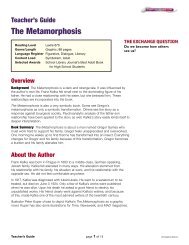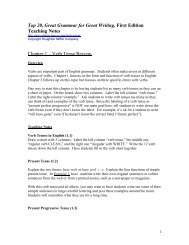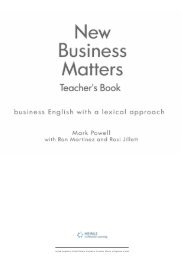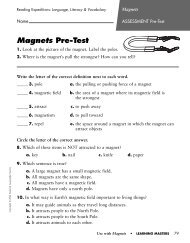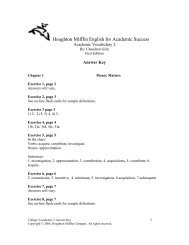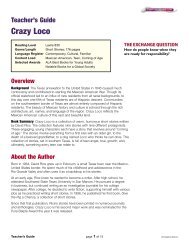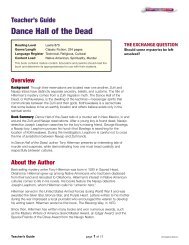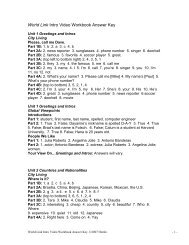Weaving It Together
Weaving It Together
Weaving It Together
Create successful ePaper yourself
Turn your PDF publications into a flip-book with our unique Google optimized e-Paper software.
Culture Cue<br />
Some of the material in this chapter could<br />
arouse painful feelings among students<br />
who have experienced discrimination<br />
because of their minority status. Be sure to<br />
take this into account as you monitor class<br />
discussions.<br />
Internet Activity<br />
You might ask students to write a short<br />
summary of what they fi nd out about<br />
Sherpas and download a picture of some<br />
Sherpa people and their homes. Have<br />
them display their writing and pictures in<br />
the classroom so that others can look at<br />
them.<br />
Predicting, p. 99<br />
Answers will vary.<br />
Vocabulary<br />
A. Vocabulary in Context, p. 102<br />
1. b 2. d 3. b 4. a 5. c 6. a 7. d<br />
8. b 9. c 10. a 11. b<br />
B. Vocabulary Building, p. 103<br />
1. a. worn b. wear 2. a. discovered<br />
b. discoveries 3. a. agricultural<br />
b. agriculture<br />
C. Vocabulary in New Context, p. 103<br />
Answers will vary.<br />
Reading Comprehension<br />
A. Looking for the Main Ideas, p. 104<br />
1. a 2. b 3. d<br />
38 Unit 4<br />
B. Looking for Details, p. 104<br />
1. F 2. T 3. T 4. T 5. F 6. F 7. F<br />
C. Making Inferences and Drawing<br />
Conclusions, p. 105<br />
Answers will vary. Possible answers:<br />
1. They were kind and generous.<br />
2. He was trying to get an education.<br />
3. Black Americans were not allowed<br />
to attend some schools. 4. Booker<br />
T. Washington had heard of the<br />
important agricultural research that<br />
George Washington Carver had done.<br />
5. He wanted to support a school that<br />
black Americans attended. 6. Many<br />
farmers switched from cotton to<br />
peanuts.<br />
Writing Skills<br />
Exercise C 1, p. 108<br />
Paragraph 2: soon after, in 1865, at age 12<br />
Paragraph 3: for the next 12 years, when,<br />
eventually, in 1890, soon<br />
Paragraph 4: in 1891, after<br />
Paragraph 5: one day<br />
Paragraph 6: in 1896, after a while, now<br />
Paragraph 7: meanwhile<br />
Paragraph 8: by the 1930s<br />
Paragraph 9: in 1940, in 1943<br />
Exercise C 2, p. 108<br />
3, 1, 5, 8, 2, 4, 7, 10, 11, 13, 6, 9, 12<br />
Exercise C 3, p. 108<br />
Paragraph 1: greatest scientists; quiet . . .<br />
kind man; he . . . rich; greatest good;<br />
greatest number<br />
Paragraph 2: last name<br />
Paragraph 3: next . . . years; he . . . black<br />
00238-X_006-073.indd 38 11/12/09 8:39 PM



